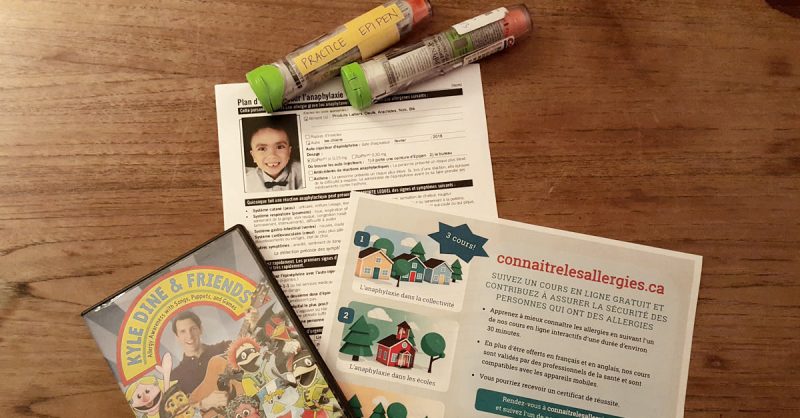I feel really conflicted during this time of year. A big part of me is so tired from “entertaining” my kids for the past 8 weeks that I can’t wait until school starts, but another part of me feels anxious about sending my child with multiple food allergies to a new environment with a different teacher and classmates. My son is excited about all of the new possibilities and I’m a mess.
As much as I’d love to just bury my emotions in a large bowl of popcorn and cross my fingers for good luck until next June, that’s just not an option. When you send a six year old child with anaphylaxis to dairy, eggs, peanuts, tree nuts and wheat to school, you need to be proactive and involved. It’s important that you meet the teacher and ensure they are adequately knowledgeable on food allergies. The teacher needs to understand that they are your partner in keeping your child safe.
My husband and I requested a short meeting with my son’s teacher and she was gracious enough to give us some of her time. It’s not customary for teachers to meet with parents before the school year begins, so we are grateful and feel lucky that the teacher is already showing us that she wants to be our partner in food allergy management.
I put together a package for my son’s teacher with the following items:
- Individual Emergency Anaphylaxis Plan with instructions on how to use an Epipen. This is a 1 page document with my child’s photo, a list of his allergens, the location of his Epipen and emergency contact numbers. I made 2 copies; one for the teacher and the other for school administration. This form is available on the Food Allergy Canada website.
- A backup Epipen to be kept in the school’s office in case of emergency. My son will always have an Epipen with him on his belt, but this second Epipen will be used in case the one he is carrying fails, or if he needs an additional shot. It’s nice to get this done before the bustle of the first day of school so you can be sure that the medication does not go missing.
- A practice Epipen so that I can train the teacher and she can have some practical experience with an Epipen. It takes minutes to demonstrate how to use an Epipen and there’s no better peace of mind than knowing your child’s teacher can confidently administer epinephrine if needed.
- Information on the AllergyAware.ca free online courses in case my child’s teacher wants to learn more about food allergies. Food Allergy Canada has developed free online courses that take approximately 30 minutes to complete. There is a course for teachers and school personnel, a course for child caregivers and a general course for community members.
- We lend our copy of the Kyle Dine DVD to help the teacher educate her class on food allergy management. The Kyle Dine DVD presents food allergies in a fun and interactive way, so that kids learn what they need to know to keep their classmates with food allergies safe. Last year my son’s teacher played the video to her class (which is ideal), but the teacher might choose to watch the video and repackage his message in her own way. Either way, I understand that it can be difficult to teach a class of young children about food allergies, especially if you don’t live with food allergies, so I’m just helping by providing the teacher with tools she can use.
In Ontario, Sabrina’s Law requires every school board to establish and maintain an anaphylaxis policy to help students with serious allergies. It also requires that schools create individual plans for each student at risk of anaphylaxis, but the onus is not only on the school administration. It’s important to be a proactive parent and to communicate with school staff regularly and provide constructive feedback.
Emotions can often run high, but you need to remember that a teacher looks after 25 or more children. Don’t arrive with a list of demands. Instead, bring a list of discussion points, and work together to find strategies that will keep your child safe.
These are the points I plan to discuss with my child’s teacher:
- Birthday celebrations. Will she allow parents to bring food to celebrate birthdays? If so, can she provide us with a list of birthdays so that we can provide a safe alternative for our son to eat during the celebration.
- Incentives. Will food be used as an incentive? If so, we will happily provide a safe alternative for our son.
- Fruit. Teachers sometimes serve fruit to their class. Explain how sensitive my son is to his allergens so that she can make sure surfaces are clean and hands are washed when the fruit is prepared.
- Hand washing AFTER eating. Explain how enforcing this simple policy will help keep my son safe.
Some other points for discussion could be providing an allergen-free area where your child can eat lunch and snacks (if that is your desire), and adult supervision during meals and in the yard.
An excellent resource for school safety can be found on OurAllergicLife.com.
I wish you and your loved ones a safe and reaction-free school year!!

